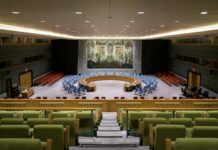Photo credit: DiasporaEngager (www.DiasporaEngager.com).
My friend, Marc, lives in a medium-sized city in France with a medium-sized Jewish community. He considers himself a “medium” Jew. He wears a Star of David necklace, but not a kippah. On Friday nights, his family gathers for Shabbat dinner and lights candles, but they watch TV afterwards. He goes to synagogue for bar and bat mitzvahs, but otherwise prefers to relax at home on Saturday mornings. He usually goes to Israel once a year for celebrations with family members who live in the north of the country — it’s a quick and inexpensive flight from France. He has two nephews and one niece serving in the Israeli military right now.
Since October 7, his life has changed because of antisemitism. Not “grab-the-suitcase” changed, but profoundly and pervasively changed.
Antisemitic incidents and terror attacks have plagued France for two decades, but it was different before. The antisemitism Marc knew was the horror of hearing about Islamist terrorists killing Jews at a Jewish school or at a kosher store. Attacks on the street seemed mostly to happen to Jews who lived in “bad” neighborhoods. Marc knew people who knew individuals who had been assaulted, but the worst his family had experienced was the time a car of young men drove in front of his synagogue and yelled, “F— the Jews.”
After October 7, Marc is no longer just a “medium” Jew. Now he’s a “stop-and-think” Jew.
Now he sees “Death to Zionists” graffiti on the street near his synagogue, which causes him to stop and think. He knows the synagogue is safe, because it’s protected by police and the Jewish community’s own security. But he’s heard about Jews in other cities who were assaulted on their way to synagogue, and he knows the police can’t be everywhere. He read that antisemitic incidents in France increased by 10 times from October through December. He stops and thinks: Is there a safer route to the synagogue, even if it’s a little longer?
Marc won’t take off his Star of David necklace. But before he leaves home, he stops to think whether he remembered to tuck it into his shirt. Why take the chance of having a total stranger yell at you that you’re a child killer?
Marc wonders what his acquaintances really think of him. He has been surprised to hear people accusing Israel of genocide, even in his presence, when they know he has family there and visits often. They don’t know his nephews and niece are in the IDF, and he would never mention that.
Spring break is coming up, and Marc stops and thinks about the decision to send his kids to university in France, not Israel. They have called several times to talk about their uneasiness when they hear calls for Israel’s destruction at the anti-Israel demonstrations on their campuses. His kids don’t fear for their safety, but they do worry for their people.
Only when he is in the company of other Jews at a Shabbat dinner, is he able to truly relax. He can let his guard down and not worry about any of the multiple ways antisemitism has permeated his life.
Marc stops and thinks about the article his friend recently sent. In December, the leaders of the Belgian Jewish community wrote an op-ed in a major Brussels paper, where they stated the choice before Europe’s Jews after October 7 was “between emigrating to Israel, a country without antisemitism but at war, or remaining in countries at peace but increasingly more hostile to Jews.” Not long ago, Marc read that immigration applications to Israel by French Jews were up 430%.
It is decision time for Marc. If he no longer stops to think, but decides to leave, that will signal the beginning of the end of mainstream Jewish life in Europe. The “medium” Jews like Marc make up the majority of those who affiliate with Jewish communities in Europe and sustain their institutions.
Many European leaders have said that Europe will not be Europe without its Jews. Now is the time for European governments to take decisive action against antisemitism to avoid that fate. They need to set a public tone of zero tolerance for antisemitism. They need to instruct police and prosecutors to enforce the laws. They need to take administrative actions available to them to ensure that Jews can live openly and freely as equal citizens.
Europe’s leaders need to stop and think, because after October 7, it’s decision time for Europe’s Jews.
Andrew Srulevitch is Director of European Affairs at the Anti-Defamation League.
Source of original article: Andrew Srulevitch / Opinion – Algemeiner.com (www.algemeiner.com).
The content of this article does not necessarily reflect the views or opinion of Global Diaspora News (www.GlobalDiasporaNews.com).
To submit your press release: (https://www.GlobalDiasporaNews.com/pr).
To advertise on Global Diaspora News: (www.GlobalDiasporaNews.com/ads).
Sign up to Global Diaspora News newsletter (https://www.GlobalDiasporaNews.com/newsletter/) to start receiving updates and opportunities directly in your email inbox for free.































